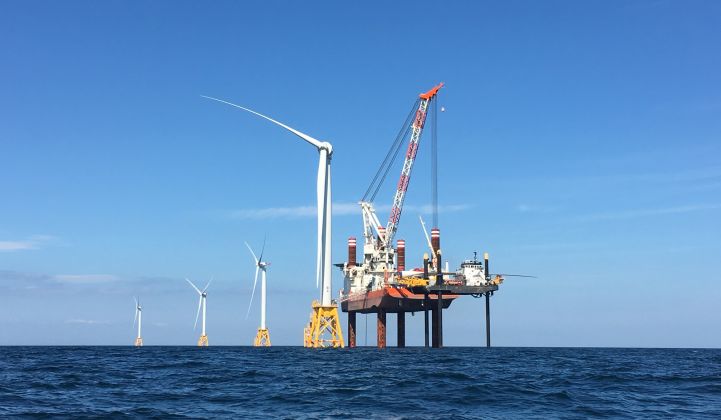Despite the coronavirus pandemic, the Bureau of Ocean Energy Management is sticking to its already-delayed timeline for deciding whether to approve Vineyard Wind’s 800-megawatt offshore wind project. At least for now.
BOEM, the agency within the Interior Department that oversees seabed leases for offshore energy development, stunned the emerging U.S. offshore wind industry last summer by delaying its decision on Vineyard’s project, originally scheduled for completion in two 400-megawatt phases in 2021-2022. Vineyard Wind is a joint venture of Iberdrola’s Avangrid utility and Copenhagen Infrastructure Partners.
In delaying the process, BOEM said the proliferation of big offshore wind projects and aggressive state targets along the Atlantic Coast had necessitated additional “cumulative impact” studies. A revised timeline published by BOEM now sees it issuing the final record of decision by December 2020.
According to Avangrid, that means the project will not reach commercial operation until 2023 at the earliest. That’s a blow to the project’s economics and supply chain, but Vineyard Wind has indicated it will press on with the project under BOEM’s revised timeline.
On Tuesday, James Bennett, manager of BOEM’s renewable energy program, said his team is in a “full telework arrangement right now” as a result of the COVID-19 shutdown. Bennett said BOEM is sticking to the timeline that would see Vineyard get its final decision by the end of this year, but he cautioned that the pandemic could knock things further off course.
“We don’t anticipate any schedule slips just yet,” Bennett told the International Partner Forum, organized by the Business Network for Offshore Wind and held virtually this year because of the pandemic.
“A lot of it will depend on how things work out with COVID and whether we’re able to have the stakeholder involvement at the level that we’d like to,” Bennett added. “But overall we’re on track and on schedule, and we’re continuing on for Vineyard Wind and the other projects as well.”
What about Ørsted's South Fork?
In addition to Vineyard, there are questions about the 132-megawatt South Fork offshore wind project being developed by Ørsted and Eversource Energy for New York.
With Vineyard delayed, South Fork is supposed to cross the finish line first — beginning construction in 2021 and reaching commercial operation in 2022. But South Fork still needs a variety of permits, running from the local to the federal level. A recent press report said New York state’s review of the project has been delayed due to COVID-19.
Among the myriad impacts the pandemic is having on the global renewables industry, it has shut many government offices or forced officials to work from home. The extent to which that results in delayed projects remains to be seen and will vary by sector and market. Many permitting processes — including those for U.S. offshore wind projects — require public hearings and local outreach that will be difficult or impossible under the current circumstances.
Beyond BOEM’s ability to issue permits for existing offshore wind projects, the pandemic could also slow the rollout of new lease auctions for additional project sites.




